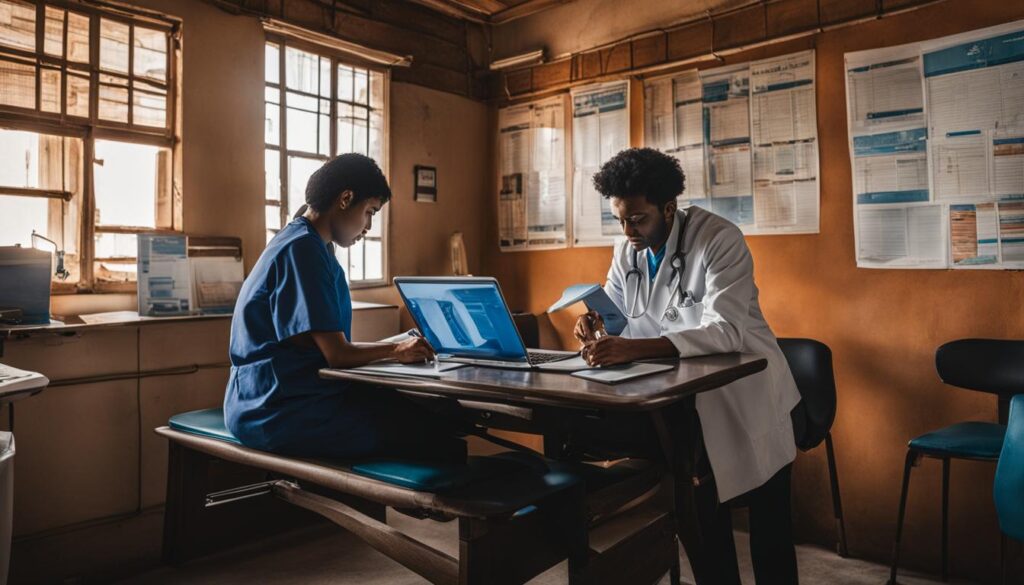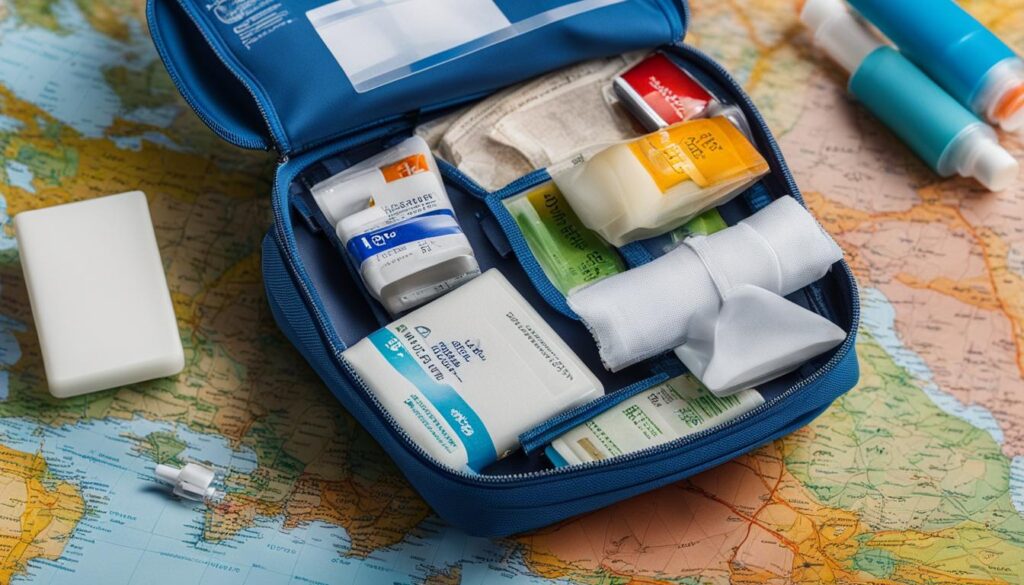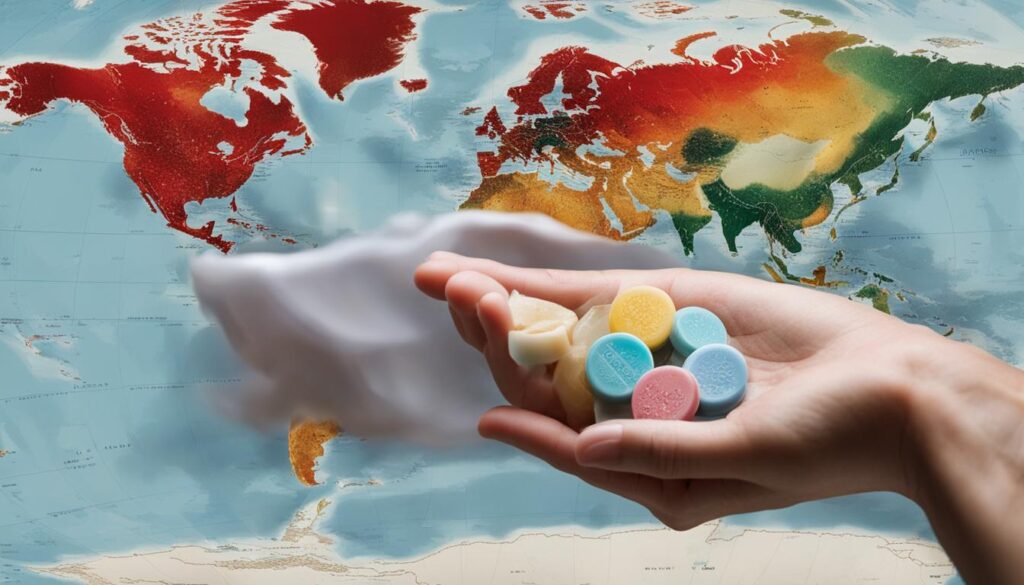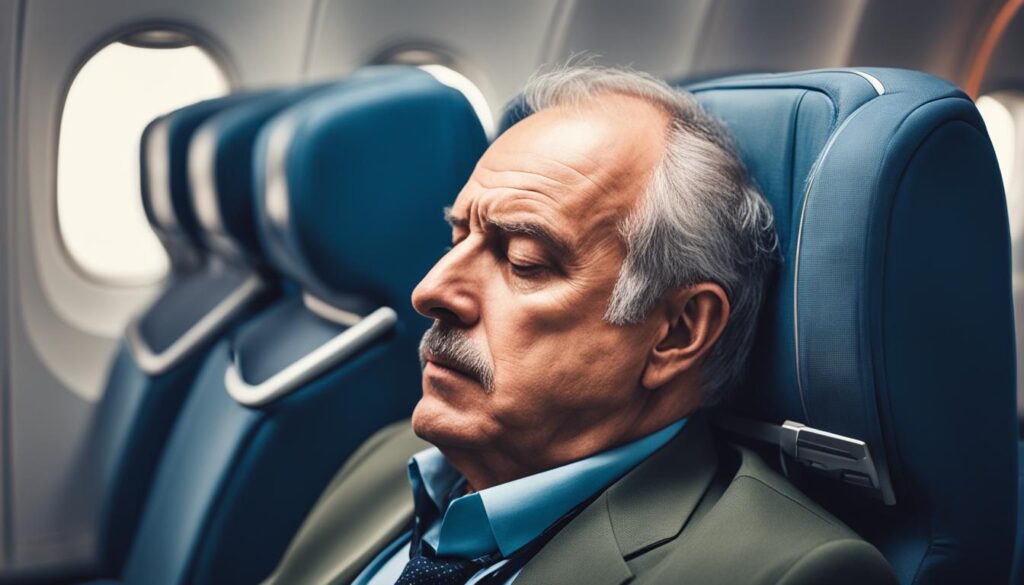Are you planning a trip soon? Before you embark on your journey, it’s essential to prioritize your health and safety. This guide provides expert travel health advice for specific destinations that will help you prepare for your upcoming trip. From vaccines to disease prevention and more, we offer valuable health tips and travel safety guidelines to ensure a safe and healthy trip.
By following our travel tips and advice, you can minimize health risks and ensure a smoother journey. Whether you’re traveling for leisure or business, staying healthy and safe during your trip is crucial. Let’s get started on preparing for your next adventure.
Understanding Travel Medicine and Vaccinations
Travel medicine and vaccinations play a crucial role in ensuring your health and safety during your trip. Vaccines protect you from infectious diseases that you may encounter in specific destinations, while travel medicine focuses on helping you stay healthy during your journey.
Before you embark on your trip, research vaccination and health guidelines for your specific destination. Discuss your travel plans with your healthcare provider at least a month prior to traveling. They can provide you with necessary recommendations and required vaccinations for your destination. It’s essential to ensure that your immunizations are up-to-date at least four to six weeks before departure to ensure the vaccines offer full protection.
The Centers for Disease Control and Prevention (CDC) is an excellent resource for researching vaccine requirements and health guidelines for specific destinations. You can also search for travel health clinics or an infectious disease specialist in your area who can provide you with necessary information and vaccinations.
| Vaccine | Prevents | Recommended for |
|---|---|---|
| COVID-19 Vaccine | COVID-19 | Everyone, if available and age-appropriate |
| Flu Vaccine | Influenza | Everyone |
| Tetanus, Diphtheria, and Pertussis (TDAP) Vaccine | Tetanus, Diphtheria, and Pertussis | Everyone, especially pregnant women and those who will be in close contact with infants. |
| Hepatitis A Vaccine | Hepatitis A | Travelers visiting areas with poor sanitation, contaminated food, or water. |
| Hepatitis B Vaccine | Hepatitis B | Travelers visiting areas with high rates of Hepatitis B, those who may come in contact with infected blood or body fluids, long-term travelers, and expats. |
| Typhoid Vaccine | Typhoid | Travelers visiting areas with poor sanitation and hygiene practices, including street food vendors. |
Remember to carry your vaccination record and any necessary medication with you while traveling. If you have any underlying medical conditions, it is vital to carry relevant medical information with you in case of any medical emergencies.
Researching Health Risks for Your Destination
When planning your trip, it’s essential to research the health risks associated with your specific destination to ensure you’re well-prepared for any potential hazards. Different locations pose varying health risks, such as infectious diseases, food and water safety concerns, and environmental factors.
To assess the potential health threats in your destination, consult with reliable online resources, such as the Centers for Disease Control and Prevention (CDC) or World Health Organization (WHO). These organizations offer country-specific health information, including disease outbreaks, vaccine recommendations, and travel advisories.
During your research, pay close attention to any mandatory vaccinations required for entry into your destination, as well as recommended vaccinations for additional protection. Be sure to schedule your vaccinations and any necessary boosters well in advance of your departure to allow sufficient time for them to take effect.
Note: Some countries may require proof of vaccination for certain diseases, such as yellow fever, before you enter. Make sure to bring any necessary documentation with you for customs officials to review. Failure to comply with these requirements may result in being denied entry to your destination.
Assessing Environmental Risk Factors
Environmental factors, such as altitude, climate, and air pollution, can also impact your health while traveling. Research your destination’s environmental factors to determine if there are any specific precautions you need to take. For example, if you’re traveling to a high-altitude destination, you may need to acclimate gradually to prevent altitude sickness.
| Environmental risk factor | Precautions to take |
|---|---|
| High altitude | Gradually acclimate to higher altitudes, stay hydrated, and avoid alcohol and strenuous physical activity until acclimatized. |
| Extreme temperatures | Dress appropriately for the climate and stay hydrated. |
| Pollution | Wear a mask to protect yourself from harmful pollutants. |
Food and Water Safety
When traveling to certain destinations, food and water safety can pose a significant health risk. Contaminated food and water can cause severe illness, including traveler’s diarrhea, typhoid fever, hepatitis A, and cholera. Research your destination’s food and water safety standards, and take necessary precautions to avoid exposure to contaminated food and water.
Note: Drink bottled or purified water and avoid ice made from tap water. Peel fruit and vegetables before eating them and avoid consuming raw or undercooked meats.
Insect-Borne Illnesses
Insect-borne illnesses, such as malaria, dengue fever, and Zika virus, are prevalent in certain destinations. Research your destination’s insect-borne illness risks and take necessary precautions to avoid exposure to bites.
Note: Wear long-sleeved shirts and pants, use insect repellent containing DEET or picaridin, and sleep in screened or air-conditioned rooms to prevent mosquito bites.
By researching and assessing potential health risks in your destination, you can take proactive steps to protect your health while traveling. Stay informed and prepared to ensure a safe and healthy journey.
Pre-travel Health Check-up and Consultation
A pre-travel health check-up and consultation with a healthcare professional is crucial to ensure a healthy and safe journey. It allows you to identify any pre-existing conditions or health concerns that may affect your travel and take necessary precautions.
Schedule your appointment at least four to six weeks before your trip to allow enough time for recommended vaccinations and to discuss your travel itinerary with your healthcare provider. During your consultation, be sure to discuss the following:
- Current Medications: Inform your healthcare provider of any current medications you may be taking and make sure you have enough medication to cover your entire trip.
- Past Medical History: Provide detailed information about your past medical history, including any chronic illnesses or surgeries.
- Destination-Specific Health Risks: Discuss any known health risks related to your specific destination, such as malaria, Zika virus, or other infectious diseases.
- Vaccination Recommendations: Make sure you are up-to-date on routine vaccinations and discuss any additional vaccinations required or recommended for your destination.
- Prevention Strategies: Ask your healthcare provider for recommendations on preventing illness during travel, such as safe food and water practices and mosquito bite prevention.
- Emergency Contacts: Obtain emergency contacts for your destination and bring a copy of your insurance information in case of any medical emergencies.
Having a pre-travel health check-up and consultation can provide peace of mind and help ensure a healthy and safe journey. Don’t skip this important step!
Essential Travel Health Supplies
To ensure you are prepared for any potential health issues while abroad, it’s important to pack essential travel health supplies. These items may vary based on your specific destination, but some universal items include:
- Medications: Pack enough prescription medication for the duration of your trip, plus a few extra days in case of travel delays. Don’t forget to bring over-the-counter medication for common ailments such as pain, fever, and allergies.
- First aid supplies: It’s always a good idea to carry a basic first aid kit that includes adhesive bandages, antiseptic wipes, tweezers, and scissors. If you plan on participating in outdoor activities such as hiking or camping, consider packing additional supplies such as a SAM splint, wound dressing, and a tourniquet.
- Insect repellent: Depending on your destination, mosquitoes and other insects may be prevalent and pose a risk for diseases such as malaria, dengue fever, and Zika. Choose an insect repellent that contains DEET, picaridin, or oil of lemon eucalyptus, and apply it liberally to all exposed skin.
- Sun protection: Protect your skin from harmful UV rays by packing sunscreen with at least SPF 30, a hat, sunglasses, and protective clothing. Sunburn and sunstroke can be serious health risks, especially in tropical destinations.
- Water bottle and filter: It’s important to stay hydrated while traveling, but tap water may not be safe to drink in some destinations. Consider packing a water bottle with a built-in filter or bringing water purification tablets to ensure you have safe drinking water.
These are just a few examples of essential travel health supplies. Research your specific destination to determine if there are any additional items you should bring along. By packing smart, you can ensure a safer, healthier journey.
Disease Prevention and Hygiene Tips
Protecting your health during travel is crucial, and practicing proper hygiene and disease prevention measures can significantly reduce your risk of illness.
When traveling to specific destinations, it’s essential to research the health risks and understand necessary precautions to take. Below are some tips to help you stay healthy on your journey:
- Wash your hands frequently with soap and water for at least 20 seconds, especially before eating or touching your face.
- Carry hand sanitizer with you and use it when soap and water are unavailable.
- Avoid touching your face, mouth, and eyes.
- Practice safe food and water practices, such as drinking bottled or boiled water and avoiding undercooked or raw foods.
- Protect against mosquito bites by wearing long-sleeved clothing, using insect repellent, and staying in screened or air-conditioned accommodations.
- If you develop symptoms of illness, such as fever, cough, or diarrhea, seek medical attention promptly.
Remember, disease prevention and taking care of your hygiene are essential aspects of travel safety. Follow these tips to stay healthy and enjoy your trip to the fullest.
Managing Jet Lag and Travel Fatigue
If you’re traveling to a different time zone, you may experience jet lag, a temporary sleep disorder that can cause fatigue, headaches, and other symptoms. To minimize the effects of jet lag, try these strategies:
- Adjust your sleep schedule: A few days before your trip, start adjusting your sleep schedule to the time zone of your destination. This can help your body adapt more quickly. Try going to bed and waking up an hour earlier or later each day, depending on your destination.
- Talk to your healthcare provider: Ask your healthcare provider if it’s safe to take melatonin or other sleep aids to help you adjust to the new time zone. They may also recommend other measures to help you cope with jet lag.
- Stay hydrated: Dehydration can worsen the symptoms of jet lag. Make sure to drink plenty of water before, during, and after your flight.
- Nap strategically: While it may be tempting to take a long nap upon arrival, try to resist the urge. Instead, take short naps of 20-30 minutes throughout the day, if you need to.
- Get moving: Exercise can help alleviate symptoms of jet lag. Take a walk, jog, or bike ride to help your body adjust to the new time zone.
Travel fatigue, on the other hand, is caused by the physical and mental demands of traveling, such as long flights, time spent in transit, and lack of sleep. To prevent travel fatigue, try these tips:
- Plan for breaks: If you’re embarking on a long journey, plan ahead for breaks. This can include scheduling layovers or planning to spend a day or two resting before continuing on your travels.
- Stay active: Exercise can also help combat travel fatigue. Take a walk around the airport during layovers or plan activities that involve physical activity, such as hiking, biking, or swimming.
- Stay hydrated and nourished: Drink plenty of water and eat healthy, nourishing meals to keep your body energized during your trip.
- Take time to rest: Don’t feel obligated to pack your itinerary with activities. Schedule downtime and relaxation into your travel plans to recharge your batteries.
By taking steps to manage jet lag and travel fatigue, you’ll arrive at your destination feeling ready to explore and enjoy your travels.
Staying Active and Fit While Traveling
Staying active and fit while traveling can be challenging, but it’s important to prioritize your health to make the most out of your trip. Physical activity not only helps keep you in shape but also improves your mental well-being and energy levels.
Here are some travel tips to help you stay active:
- Choose accommodations with fitness facilities such as a gym or swimming pool.
- Take a walking tour or rent a bicycle to explore the city.
- Participate in outdoor activities such as hiking, skiing, or surfing.
- Try local sports or join a fitness class.
In addition to these tips, there are several exercises you can do in your hotel room or at the airport during layovers. These can include stretches, yoga poses, and bodyweight exercises such as squats, lunges, and push-ups.
Remember to dress comfortably and in layers to match the climate of your destination. Bring a pair of comfortable shoes and workout clothes to make it easier to fit in your exercise routine.
| Exercise | Description |
|---|---|
| Chair dips | Use a sturdy chair to perform dips for your triceps. |
| Plank | Hold a plank position for 30-60 seconds to engage core muscles. |
| Jumping jacks | A classic cardio exercise that can be done virtually anywhere. |
| Wall sit | Sit against a wall in a squat position to work the quadriceps muscle. |
Remember, it’s important to listen to your body and adjust your exercise routine according to your fitness level and any pre-existing health conditions. Staying active and fit while traveling requires planning and commitment, but the benefits for your overall health and well-being make it worthwhile.
Mental Health and Well-being During Travel
Traveling can be exhilarating, but it can also be mentally taxing. The disruption of routines, unfamiliar surroundings, and social isolation can cause stress, anxiety, and homesickness. Prioritizing your mental health and well-being during travel is crucial for a fulfilling trip.
Here are some travel tips to help nourish your mental health:
- Practice mindfulness exercises to stay grounded and present.
- Stay connected with loved ones through video chats or social media to alleviate feelings of loneliness.
- Schedule self-care practices into your itinerary, such as a spa day or nature walk.
- Seek support when needed, such as talking to a professional counselor or finding a support group in your destination.
Remember, taking care of your mental health is just as important as physical health. By incorporating these well-being practices into your travel plans, you can enjoy a refreshing and rejuvenating journey to your specific destination.
Healthcare Resources and Emergency Contacts Abroad
When traveling to a specific destination, it’s important to be aware of healthcare resources and emergency contacts in case of any medical emergencies. Familiarizing yourself with these contacts can provide peace of mind and ensure that you receive the proper care if needed.
Before departing, research healthcare facilities in your destination and make a list of their contact information. This list should include hospitals, clinics, and general practitioners in case of non-emergency medical issues.
In addition to healthcare facilities, it’s important to have local emergency contacts in case of any urgent situations. These contacts should include the police, fire department, and ambulance services. Keep this list of contacts on hand in case of emergency and ensure that it is easily accessible.
It’s recommended to also carry a list of your personal emergency contacts, such as family members or friends, and any necessary medical information (such as allergies) in case of emergency while traveling.
Lastly, it’s important to have appropriate travel insurance, as it can provide additional resources and coverage in case of unexpected medical expenses. Be sure to understand your insurance coverage and options for additional travel insurance before departing.
Remember to prioritize your health and well-being during your travels. By planning ahead and taking necessary precautions, you can enjoy your trip without any unexpected medical issues.
Health Insurance and Travel Coverage
When planning your trip, it’s important to consider the unexpected, including possible medical expenses. Having the appropriate health insurance and travel coverage can protect you financially and provide peace of mind while traveling.
Before traveling, review your current health insurance policy to understand what is covered outside of your home country. Many policies won’t cover medical expenses abroad, or may only cover a limited amount. If your policy does not provide sufficient coverage, consider purchasing additional travel insurance to supplement your existing policy.
When choosing travel insurance, be sure to consider your specific destination and intended activities, as some policies may exclude coverage for certain high-risk activities such as extreme sports. Additionally, check the coverage limits, deductibles, and exclusions to ensure the policy meets your needs.
Remember to keep a copy of your health insurance and travel insurance policy documents with you while traveling, and ensure you understand any stipulations and procedures for making a claim.
It’s also important to research healthcare resources and emergency contacts in your destination, as some countries may not have a reliable healthcare system. Medical treatment abroad can be expensive, so it’s important to plan ahead and be prepared for any potential medical emergencies.
Tips for Purchasing Travel Insurance:
| Tip | Description |
|---|---|
| Compare policies | Research and compare different travel insurance policies to find the best fit for your needs and budget. |
| Consider the destination | Ensure the policy covers medical expenses and emergency medical evacuation for the specific destination you plan to travel to. |
| Check coverage limits | Check that the policy provides adequate coverage limits, including medical expenses and emergency evacuations. |
| Look for pre-existing condition coverage | If you have a pre-existing condition, make sure the policy covers it, otherwise, any related medical expenses will not be covered. |
| Check for exclusions | Ensure that the policy covers any intended activities and does not exclude coverage for high-risk activities or extreme sports. |
By understanding your insurance coverage and purchasing appropriate travel insurance, you can ensure peace of mind and financial protection during your travels. Always remember to keep important documents with you and research healthcare resources for your destination to stay safe and healthy while abroad.
Conclusion
In conclusion, by following these travel health advice and guidelines for specific destinations, you can help minimize health risks and ensure a safe and enjoyable journey. Remember to plan ahead and consult with healthcare professionals before embarking on your trip to ensure you have the necessary vaccinations and medications. It’s also important to stay aware of the health conditions in your destination and take necessary precautions to prevent illnesses.
Remember to pack essential travel health supplies, practice proper hygiene, manage jet lag and travel fatigue, stay active and fit, prioritize your mental health and well-being, and familiarize yourself with healthcare resources and emergency contacts abroad. It’s also crucial to have appropriate health insurance and travel coverage to protect yourself financially in case of unexpected medical expenses.
Safe travels!

















































